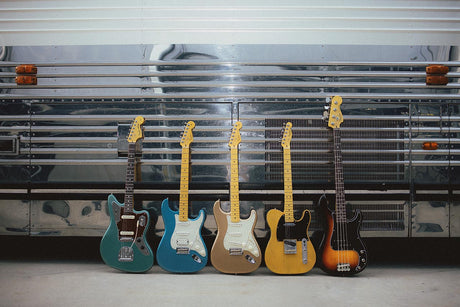What’s The Difference?
Aside from the different pickups, the Les Paul Classic has a Slim Taper neck profile (closer to a 60s profile) which is really comfortable, especially for faster players whereas the Les Paul Traditional has a chunkier, Rounded neck profile – as they were in the late 50s. The Les Paul Classic has kidney Grover machine heads (similar to the ones some players swapped their keystone tuners for in the 60s) – the Traditional has got 50s style, keystone tuners. The Traditional also has no weight relief, whereas the Classic does. This means that the Classic will be a little lighter, which is definitely something to consider. In theory, the Traditional not having any weight relief, will mean that it sustains a little more, though that’s very much up for debate (you could argue that more air within the body of the Classic gives it a little extra resonance). Both guitars also come with a great quality hard case.
The Sound
The 2019 Les Paul Classic is fitted with a pair of Burstbucker 61 rhythm and treble pickups. These are modern representations of the later era of the PAF pickup that helped create that iconic Gibson sound we all know and love. They use Alnico V magnets (as opposed to Alnico II on the Traditional), and to my ears, they’re a little more aggressive than the Burstbucker 1 & 2s, as well as being a touch brighter and have a little more attack. Playing through a Vox AC15, the Traditional was a little sweeter sounding, and seemed to have more harmonic overtones ringing out – whether that’s a result of the pickups, the wood, or other factors is subject for debate. Personally, I prefer the sound of lower output pickups, so for me, the Traditional would be what I’d gravitate towards, however, the Classic has everything you’d want in a Les Paul too.
It’s worth talking about the coil tap function on the Les Paul Classic too. If you lift up the volume knobs, you can basically make your humbuckers sound more like single coils. Having the coil tap function on this guitar does mean it’s really versatile – need a different sound for one part of a song during a gig? Just engage the coil tap and you’ve got it right there, without any pedals, or extra guitars. The Les Paul Traditional does not have this feature, though that’s how many purists want it.
Conclusion









